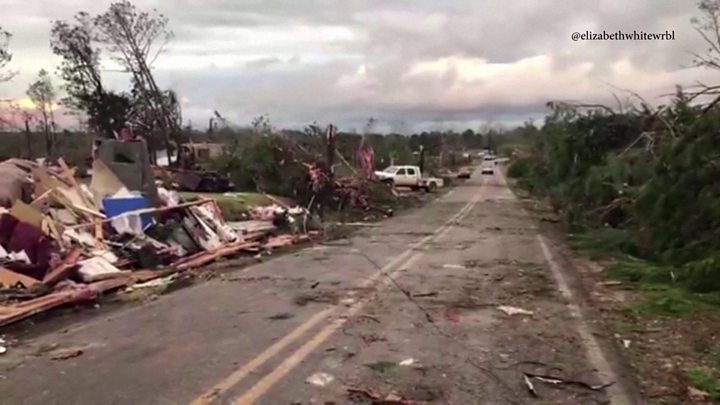Alabama tornadoes: Lee County search operations resume

Rescue teams in eastern Alabama have resumed search operations a day after two tornadoes caused extensive damage to buildings and roads.
At least 23 people are known to have died in Lee County, some of them children, with the youngest believed to have been six years old.
There are fears that the death toll will rise. Dozens of people were hurt.
The sheriff of Lee County, Jay Jones, told local media that the devastation caused by the winds was "incredible".
He said: "It looks like someone has taken a giant knife and scraped the ground. There are slabs where homes formally stood, debris everywhere... whole forested areas with trees are snapped and lying on the ground... a lot of devastation out there."
Nearly 2,000 homes in the affected area are without power following the tornadoes.
A state-wide state of emergency is in operation, with resources from across the state pouring into the affected area. Drones with infrared capability are being used in an attempt to find survivors.
Rescue efforts were halted overnight because of the dangers associated with searching in the dark.
Where did the tornadoes strike?
The area around Beauregard, about 60 miles (95km) east of Alabama's state capital Montgomery, appears to have borne the brunt.
The tornadoes there struck at about 14:00 (20:00 GMT) on Sunday, carving a path at least a half a mile wide and at least a mile long.
Footage of the aftermath shows snapped communications poles, roads littered with debris and wrecked houses.
The National Weather Service (NWS) made a classification of at least EF-3 - meaning winds of up to 165mph (266km/h).
Local resident Scott Fillmer said: "Everything just kind of went dark, when it was almost like night outside. And it's that old cliché that it sounds like a freight train coming, well that's what it sounded like."
Residents of Smiths Station told local TV they had seen businesses destroyed there. A large bar called the Buck Wild Saloon had had its roof torn off.
Tornado warnings were also issued for Georgia, Florida and South Carolina. Footage showed smashed buildings and snapped trees in Talbotton, about 80 miles south of Atlanta.
Tornadoes were also reported in Walton County and Cairo in northern Florida.
What do we know about the casualties?
All of the deaths reported so far have been in Lee County. Authorities say they are still working to identify the victims and the injured.
"We've never had a mass fatality situation, that I can remember, like this in my lifetime," Lee County coroner Bill Harris said.
Alabama meteorologist Eric Snitil tweeted that there had been more tornado deaths in Lee County in one day than in the whole US during 2018.
Several people were reported hurt in Talbotton in Georgia, though none seriously.
What's been the reaction?
Alabama Governor Kay Ivey posted on Twitter to warn residents there could be more extreme weather to come.
"Our hearts go out to those who lost their lives in the storms that hit Lee County today," she wrote.
President Donald Trump tweeted: "To the great people of Alabama and surrounding areas: Please be careful and safe... To the families and friends of the victims, and to the injured, God bless you all!"
Apple CEO Tim Cook, who was born in Mobile in the south-west of the state, said he was "devastated" by the news, saying Lee County was "a place close to my heart".
Are tornadoes expected at this time of year?
This series has occurred earlier than the traditional peak season for tornadoes, which runs from April to June, when more than half of the year's tornadoes generally strike.
Weather systems are more conducive in these months. Warm air flows north from the Gulf of Mexico at the same time as storm systems are propelled into the south and mid-west by a southward dip in the jet stream.
These latest tornadoes appear to have caused the highest death toll since 35 people were killed in Arkansas and Mississippi in April 2014.
A "super outbreak" of tornadoes across a swathe of the US in April 2011 killed more than 300 people.
Are you in the area? If it is safe to do so, share your experiences by emailing haveyoursay@bbc.co.uk.
Please include a contact number if you are willing to speak to a BBC journalist. You can also contact us in the following ways: